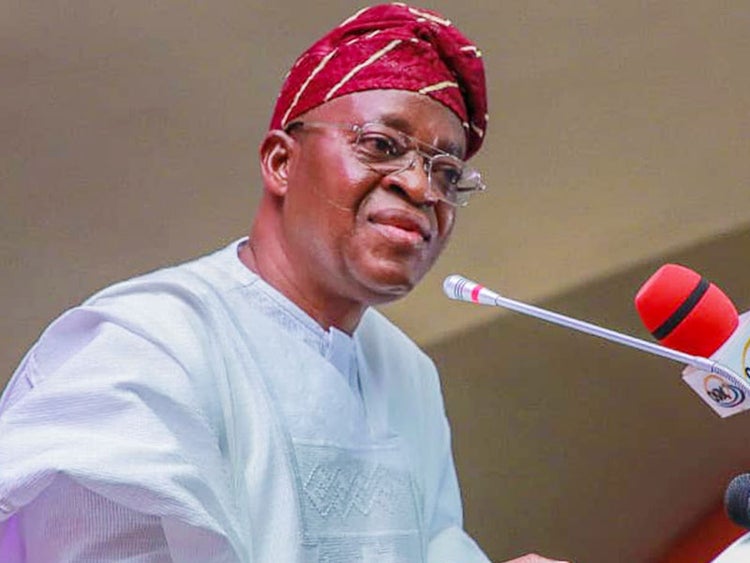COVER
Tension in CAC as Registrar General, Workers Tango

By Prosper Okoye, Abuja
Amidst rising level of unemployment in the country, at least 200 staff of the Corporate Affairs Commission (CAC) may have resigned their appointments in the last three years ahead of due retirement dates to escape possible dismissal, alleged high handedness and other harsh policies of the Commission under the leadership of Alhaji Garba Abubakar, the Registrar General and Chief Executive.
DAILY ASSET investigations revealed that since assumption of office in January 2020, Abubakar, who was hitherto a staff before his appointment has governed the frontline agency with an iron fist leading to mass resignation of the staff out of frustration.
Others were actually forced to resign due to the administrative measures taken by management, investigations revealed.“Due to high handedness, vindictive leadership style and gross incompetence, staff have been resigning from the Commission in droves” a source familiar with the situation maintained.
Obviously embarrassed by the mass resignations, the Registrar General had in June 2021 allegedly issued a circular to staff warning that the Commission would with hold for one year, the terminal benefits of any staff who voluntarily resigned.
As the resignations still continued unabated, Registrar General was said to have issued yet another circular on October 4, 2021, with the title “Notification of Exit from Service” in which he said the Commission would put on hold terminal benefits of staff to dissuade more workers from leaving.
The mass resignations was said to have shrunk the Commission’s workforce to a paltry 1,300 spread across 36 states of the Federation, where it has state offices and the Abuja headquarters.
Abubakar was said to have capitalised on the absence of a governing Board for nearly three years to operate the Commission’s activities on his whims and discretions and in some cases with impunity, it was alleged.
Investigations revealed that in order to pave way for his seemingly dictatorial style of leadership, the Registrar General unilaterally dissolved the staff Union- Amalgamated Union of Public Corporations, Civil Service Technical and Recreational Employees (AUPCTRE), soon on assumption of office.
In its place, he was said to have inspired the formation of a parallel workers union- Senior Staff Association of Statutory Corporations and Government Ownes Companies (SSASGOC) with an Executive Committee loyal to his management team, a source told DAILY ASSET.
And in order to wade off any opposition to the decision, Abubakar is alleged to have placed about 30 executive members of the Union(AUPCTRE) and other staff perceived as antagonistic to his policies on “punitive transfers” to 30 states of the federation, where the Commission has branch offices.
The transfers were said to have been carried out without recourse to staff needs or expertise required in the state offices.
Although the Commission was said to have expended about N50 million to settle transfer allowances for the affected the staff, the expenditure was heavily criticised as some staff considered it inappropriate in the circumstances of the Commission.
After the staff were successfully redeployed, the Registrar General was said to have directed that none of the transferred staff be allowed to proceed on annual leave, bereavement, casual or sick vacation, all in the bid to prevent any form of regrouping by the unionists.
“It is bare faced punishment” one of the affected staff, who didn’t want his name in print, told DAILY ASSET.
The obviously dissatisfied union leaders, had challenged the Commission’s decision to proscribe AUPCTRE in Court and actually obtained judgment.
However, the Registrar General himself a Lawyer was said to have declined compliance with the judgment of Court and instead proceeded to the Court of Appeal, where the matter was said to have been abandoned.
In another alleged act of impunity, a Deputy Director and Head, Department of Department (names withheld) was transferred on the orders of the Chief Executive to Enugu zonal office, barely a week after his assumption of office.
The said staff was subsequently accused of corrupt practices and suspended for six months from office without any evidence neither was due process followed.
It was learnt that the staff had challenged his suspension in Court and obtained favourable judgment at the National Industrial Court and the Commission was ordered to pay all his entitlements and a compensation of N2million.
Rather than comply with the Court Order, the CAC Chief Executive allegedly ordered another “punitive” transfer of the staff to Jalingo office and subsequently appealed against the judgment. However, a source said the Matter too might have been abandoned at the Appeal Court since the trial Court turned down the Commission’s application for stay of execution.
Also, exploiting the absence of a governing Board, the Registrar General is alleged to have unilaterally recruited two Directors (Human Resources and Finance and Accounts) in 2020 even when there was no budgetary allocation for such high level manpower.
In another instance, a Deputy Director, who had passed all prescribed examinations and adjudged competent to be promoted to the next rank of Director of ICT was blatantly told by the Commission’s boss that he would not be promoted. No reasons were advanced for this supposed victimisation, it was also learnt.
The alleged impunity of the Registrar General was capped by the recent suspension of Chairman of the proscribed AUPCTRE Chairman, a Principal Manager on GL14, whose suspension according to the Commission’s rules could only be approved by a governing Board.
Abubakar was also accused of “modern slavery” with the circular of December 25, 2021 in which he directed staff of the Commission not to use mobile phones while on duty.
“By the force of the said circular, staff were mandated to switch off their mobile phones and keep in a designated box until close of work effective January 2022”, a staff said of the situation.
The staff said the “disrespect of staff” and “violation of their rights” had been extended to Directors who reduced to personal staff of the Chief Executive in the daily operations of the Commission.
DAILY sought the response of the Registrar General through a letter dated June 20, to the RG seeking his comments on the specific allegations against him.
The letter was duly acknowledged on June 21, but there was no response from the Commission at the time of this report.
Business News
Blue Economy Targets Top Spot in PEBEC – Oyetola

From Anthony Nwachukwu, Lagos
Mindful of the sector’s critical role in economic diversification and sustainable development, the Ministry of Marine and Blue Economy aims to place Nigeria tops in the Presidential Enabling Business Environment Council (PEBEC) by achieving ease of doing business and fostering a conducive environment for trade and investment.
To this end, the Minister, Adegboyega Oyetola, said the ministry plans to elevate Nigeria’s maritime sector to global standards and has prioritised the implementation of the national single window and port community system to automate port processes, in order to enhance operational efficiency and attract investments.
Oyetola, who spoke at the BusinessDay Maritime Conference in Lagos Thursday, disclosed that the ministry has already reported significant progress in revenue generation, driven by innovative strategies to block revenue leakages and explore new sources within the marine and blue economy sector.
Others include ongoing efforts to upgrade infrastructure, such as the development of inland dry ports and modernisation projects at key ports across the country, while public-private partnerships (PPPs) in advancing port modernisation, dredging activities and deploying cutting-edge maritime technologies remain important.
He further announced plans for the development of additional deep-sea ports on a PPP basis to further bolster Nigeria’s maritime capabilities.
Acknowledging the significant contributions of participants in shaping the discourse in Nigeria’s marine and blue economy, Oyetola expressed hope that insights from the conference would drive positive transformations and propel Nigeria towards greater economic prosperity through the harnessing of its vast maritime resources.
He restated his commitment to developing a dynamic national policy framework for the sector by the end of the year, while urging all stakeholders to continue working together towards realising the sector’s full potential, ensuring sustainable growth and inclusive development across coastal communities.
COVER
Tinubu Receives Bill Proposing Return to Regional Gov’t

By David Torough, Abuja
President Bola Tinubu is expected to receive a draft bill seeking a return to a regional system of government for Nigeria today.
The proposed legislation authored by a chieftain of the Yoruba socio-cultural association, Afenifere, Akin Fapohunda, and titled, “A Bill for an Act to substitute the annexure to Decree 24 of 1999 with New Governance Model for the Federal Republic of Nigeria’, seeks among others, new extant laws to be cited as “The Constitution of the Federal Republic of Nigeria New Governance Model for Nigeria Act 2024.
”Last week that the said bill was disowned by the House of Representatives whose spokesman, Akin Rotimi, and the Chairman, Committee on Rules and Business said it had not been listed for deliberation in the ongoing moves to review the 1999 Constitution (as amended).
However, Fapohunda disclosed on Thursday that the bill would be transmitted to the President today.
Meanwhile, Fapohunda who also represents the Coalition of Indigenous Ethnic Nationalities said that the organisation is proposing the division of the country into eight geo-political regions with approximate interim boundaries.
The proposed regions, according to Fapohunda, include, the southern region to be made up of Akwa-Ibom, Bayelsa, and Cross Rivers States and “Optional inclusions of the Annang, Effik, Ekoi, Ibibio, Oro Ohaji/Egbema in Southern Imo, the Adonia, Efemia, Ijaw, Ogoni, Bini, Ishan, Isoko, Urhobo and the Ijaw-speaking people in Northern Ondo State with land contiguity.”
He continued, “The South Eastern region consists of Abia, Anambra, Ebonyi, Enugu, and Imo States. The Western region comprises Lagos, Ogun, Ondo, Osun, Oyo, and Ekiti States, incorporating the Yoruba-speaking people in Kogi and the Igbomina people in Kwara State. Additional options would be for the Itsekiri people of Delta State and Akoko-Edo people of Edo State to make their respective choices.”
Others include the Mid-Western Region “Made up of Edo and Delta States, possibly incorporating the Anioma people and the Eastern Middle Belt Region comprising Northern Cross River, Southern Kaduna, Southern Borno, Adamawa, Benue, Kogi, Plateau, Nasarawa and Taraba States.”
The Western Middle Belt Region comprises Southern Kebbi, parts of Kwara and Niger States while the North Eastern Region will be made up of parts of Borno, Gombe, Bauchi, Jigawa, and Yobe States.
The North Western Region, according to the Afenifere chieftain, comprises Kaduna, parts of Kebbi, Kano, Katsina, Sokoto and Zamfara States.
Fapohunda said the coalition envisaged a two-tier government, federal and regions, adding that the latter would be at liberty to manage her affairs, “Including the creation of sub-entities, based on the stipulations that are agreed upon and embedded in their respective constitutions.”
In its proposed governance stipulations, CIEN stated that “In the quest for re-configuration and downsizing, an option to consider might be to retain the present boundaries of the 36 States, as would have been adjusted, but to creatively downgrade the paraphernalia of political administration as follows:
“To introduce a new regional government framework with executive and legislative functions and bodies with the headship title of Premier.
“In the new dispensation, the present States (for example the six in the Western region) would be converted to provinces. Governance at this level shall be by Provincial Councils that integrate executive and legislative functions, with Chairman and Support Specialist Administrative Officers. The regions shall be at liberty to create provinces, subject to viability and self-sustainability.
“The present Local Government Areas are to be transformed into divisions, with divisional managers and specialist administrative officers; to operate as socio-economic development institutions. The new provinces shall also be at liberty to create divisions, subject to viability and self-sustainability.”
The coalition also proposed a new constitution to embody novelties including freedom of the regions to “Create, merge and or re-configure their sub-political units and may adopt provinces, divisions or districts as may suit their circumstances without interference from any other authority.
“Regions and sub-regional entities are to be reconfigured such as would reduce the cost of public and civil service administration to less than 20 to 30 per cent of generated revenue.
“In drafting their Constitutions, the peoples of the respective regional territories will take a cue and also dismantle any arrangement or configuration that will favour the politicians and the political class; with a focus on freeing resources for true development.
In all, the coalition proposes that the Federal Government “Shall comprise not more than nine Ministries and Ministers,” adding that “The very big United States has just 15 Cabinet Ministers, while Nigeria is not even up to just a State of Texas or New York.”
The group is also advocating a return to the parliamentary mode system of government “Built-in statutory rotation of headship among the regions.”
Bill seeking six-year single term, “anti-democratic” – NANS
Relatedly, the National Association of Nigerian Students yesterday rejected the bill seeking a single term of six years for the President and state governors, describing it as “anti-democratic” and an attempt to stifle citizens’ choices.
It will be recalled that 35 members of the House of Representatives, under the auspices of Reformed-minded Legislators, had last week proposed a bill seeking a single term of six years for the President and state governors.
The lawmakers are equally seeking for rotation of the presidency among the six geopolitical zones of the country, arguing that the proposition if implemented would lead to a reduction in the cost of governance.
However, NANS while reacting to the bill, called on Nigerians, pro-democracy groups, organised labour and trade unions to mobilise against the bill.
Speaking at a press conference in Abeokuta, Ogun State on Thursday, the National Clerk of the Senate of NANS, Yekini Adewale described the bill as “a smokescreen” to divert the attention of Nigerians from the current economic pains and agonies that Nigerians are facing.
The apex student body threatened to mobilise students across the country in a protest against the bill.
Adewale said that if the bill is passed into law, it would erode accountability, probity, transparency and responsibility on the part of political leaders.
‘Yes, democracy thrives on the pedestal of a synergy between the three arms of the government, but when a key arm such as the legislature, proposes bills and peradventure, passes laws that stifle people’s choices or throw spanners at the wheel of the tenets of democracy, then, it is disheartening and must not be allowed.
‘NANS as a non-governmental organisation and the only pressure group that has been agitating for the continued survival and sustainability of our hard-earned democracy from being truncated does not only condemn the proposed bills but calls on Nigerians to move against such step aimed at achieving a selfish agenda by some unscrupulous politicians.
‘If the proposed bills are allowed to see the light of day, then, our democracy is in total jeopardy.
‘Any president or governor who realises that he cannot seek a second term in office, may rather busy himself feathering his own nose instead of delivering good governance to the electorate.
“Expunging the second term from our constitution is synonymous with extinguishing the only power the electorate has to vote out any non-performing president or governor.
‘As a student body in the country, we shall mobilise our members massively against these bills seeking to efface accountability, probity, transparency and responsibility from the elected executives and lawmakers.
‘To further demonstrate our rejection of these anti-democracy, anti-people and anti-progress bills, a day will be set aside for Nigerian students to embark on a mass march against the National Assembly,” Adewale said.
COVER
LG Autonomy: S/Court Reserves Judgement on FG’s Suit against 36 Govs

By Lubem Myeorny, Abuja
The Supreme Court yesterday reserved judgment in a suit filed by the Federal Government against the governors of the 36 states of the federation over alleged misconduct in the administration of Local Government Areas.
Justice Garba Lawal, who led a seven-member panel of Justices of the apex court reserved judgment after all parties, adopted their various written addresses earlier.
Lawal said the date for judgment will be communicated later.
The Attorney-General of the Federation (AGF) and Minister of Justice, Lateef Fagbemi, SAN, had on behalf of the federal government sued the 36 states over the manner the governors are running the LGs funds.
In the suit marked SC/CV/343/2024, the AGF prayed the apex court for an order prohibiting state governors from unilateral, arbitrary and unlawful dissolution of democratically elected local government executives.
Fagbemi in the originating summons is praying the Supreme Court for an order permitting the funds standing in the credits of local governments to be directly channelled to them from the Federation Account in line with the provisions of the Constitution as against the alleged unlawful joint accounts created by governors.
He also sought an order of the apex court stopping governors from constituting caretaker committees to run the affairs of local governments as against the constitutionally recognised and guaranteed democratic system.
He applied for an order of injunction restraining the governors, their agents, and privies from receiving, spending, or tampering with funds released from the federation account for the benefit of local governments when no democratically elected local government system is put in place.
Fagbemi asked the apex court to invoke sections 1, 4, 5, 7, and 14 of the constitution to declare that the state governors and State Houses of Assembly are under obligation to ensure a democratic system at the third tier of government.
The suit also wants the apex court to invoke the same sections to hold that the governors cannot lawfully dissolve democratically elected local government councils.
In a 13-paragraph affidavit in support of the originating summons deposed to by Kelechi Ohaeri from the AGF’s office, Fagbemi averred that he filed the suit under the original jurisdiction of the Supreme Court on behalf of the federal government.
The deponent asserted that the local government system recognised by the constitution is a democratically elected local government council and that the amount due to local government councils from the federation account is to be paid to the local government system recognised by the constitution.
That the governors represent the component states of the Federation with Executive Governors who have also sworn to uphold the Constitution and to, at all times, give effect to the Constitution, and that the Constitution, being the supreme law, has binding force all over the Federation of Nigeria.
Other prayers include: that the constitution of Nigeria recognises federal, state, and local governments as three tiers of government, and that the three recognised tiers of government draw funds for their operation and functioning from the Federation Account created by the Constitution.
By the provisions of the Constitution, there must be a democratically elected local government system, and the Constitution has not made provisions for any other systems of governance at the local government level other than a democratically elected local government system.
In the face of the clear provisions of the Constitution, the governors have failed and refused to put in place a democratically elected local government system, even where no state of emergency has been declared to warrant the suspension of democratic institutions in the state.
The failure of the governors to put a democratically elected local government system in place is a deliberate subversion of the 1999 Constitution, which they and the President have sworn to uphold.
Fagbemi also said that all efforts to make the governors comply with the dictates of the 1999 Constitution in terms of putting in place a democratically elected local government system have not yielded any result.
The AGF said that the federal government continued to disburse funds from the Federation Account to the governors for non-existing democratically elected local governments to undermine the sanctity of the 1999 Constitution.
He averred that in the face of the violations of the 1999 Constitution, the federal government is not obligated, under Section 162 of the Constitution, to pay any state funds standing to the credit of local governments where no democratically elected local government is in place.
























